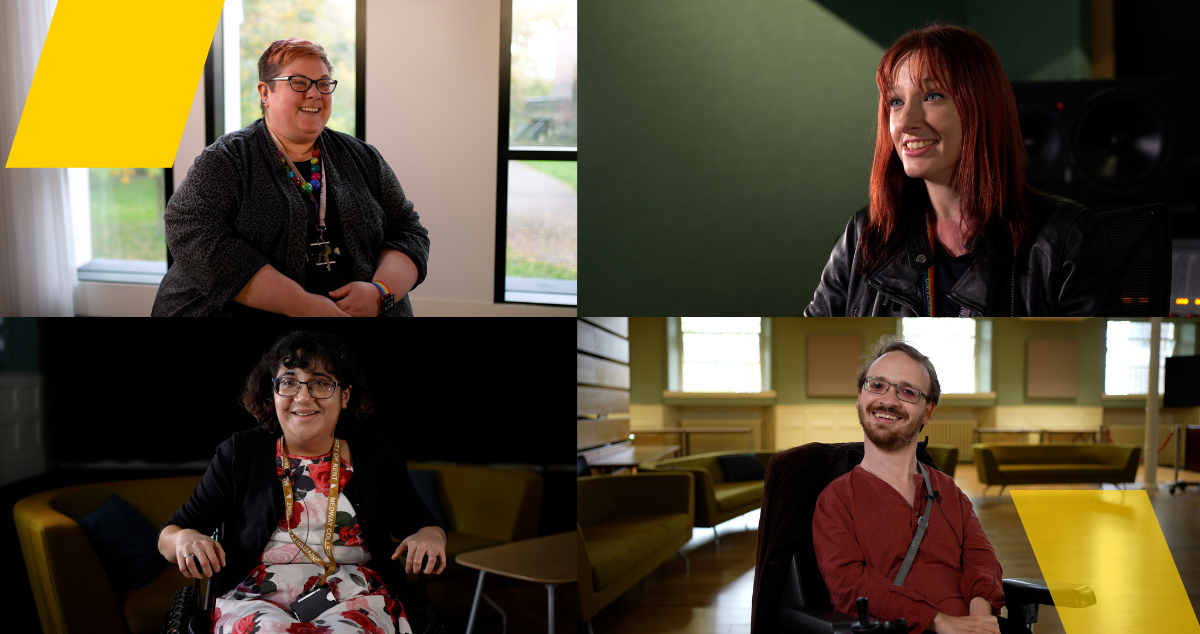Disability History Month (16 November – 16 December 2023) is an annual event that aims to promote acceptance of disabilities (physical, mental, visible and hidden) and champion change to ensure that all people have fair and equitable access to opportunities and services.
At Kent, we use the month as an opportunity to shine a spotlight on the services we have available, ask students to tell us what is missing, and encourage open and honest conversation to raise awareness and challenge assumptions.
The national theme for 2023 is Children and Young People, with a focus on the experience of disablement amongst children, young carers and young people in the past, now and what is needed for the future. For many of our students, this will be a recent experience and something that may have been positive, or negative.
Barriers caused by society
For a long time, society operated under the assumption that the barriers experienced by people with disabilities were caused by the limitations that their bodies and minds placed upon them (the Medical Model of Disability) and the only way to overcome these was to treat the person rather than consider how to remove the barrier.
The fact that society itself may pose a barrier for people with disabilities was not a concept that was widely considered until the Social Model of Disability was created. This model, first expressed by Kent Academic Mike Oliver, says that disability does not come from the physical or mental limitations imposed by a person’s body or mind, but rather by the limitations and barriers inflicted by society around it. These barriers could be physical (lack of drop curbs or ramps), institutional (jobs that do not adapt to the needs of people with disabilities), structural (lack of pathways for diagnosis at a young age), societal (attitudes towards mental health), or political (lack of investment in social care or individual welfare). All of these factors contribute to a society that puts barriers in place for people with disabilities. The model also supports the concept that if you remove barriers for people with disabilities, many other people also benefit (for example if you put a ramp in, a wheel chair user can easily access a building, but so can someone pushing a buggy, using a walking stick, or with a twisted ankle).
Another model is the Psychosocial Model which, like the Social Model, believes that society imposes restrictions on people but also acknowledges that some conditions do benefit from medical interventions and by adopting both approaches you offer people with disabilities the best opportunities to succeed. In short, making society more accessible for people with disabilities ensures that it is more accessible to all.
What’s on at Kent
At Kent, Disability History Month is organised by both the University of Kent and Kent Union. Events are open for staff and students and the vast majority are free. See the full list of events.
Key events include the virtual exhibition of Disability History at Kent, where you can see the evolution of support for people with disabilities from the earliest days of the University right up to present day.
There is a bookmaking workshop being run by Stella Bolaki, British Sign Language lessons, the Accessibility at Kent: Empowering Students to Learn, Work and Grow workshop, run by Student Support and Wellbeing, Careers and Employability Services and Kent Union and is your one stop shop to finding out everything at Kent that can support you, and the Neuro-Insurgence Open Mic Night, plus more.
Please check individual event listings for accessibility information. If you have any queries about the accessibility of any of our events for Disability History Month please email StudentEDI@kent.ac.uk.
Resources
- We have a large number of resources at Kent to support students with disabilities, and can signpost to external resources.
- Kent Union run the Student Accessibility Network to represent students with differing accessibility needs
- The University has the Disability Staff Network, open to any staff member with a disability
- The University has the Inclusion Passport Scheme for staff with disabilities (or any other access needs).
- The Kent Union Disability History Month webpages feature a Curiosity Hub, designed to display dozens of films, books, podcasts, celebrities and more – all handpicked by staff and students at Kent, with each recommendation relating to Disability History month and pride. There are even hand-out resources as well as links to the various schemes that are available to support Disabled students at Kent.
We are committed to ensuring that all students and staff are supported at Kent, and are able to study and work to their fullest potential. We also take discrimination, harassment and bullying extremely seriously. If you feel that you have been subjected to any form of bullying or discrimination due to a disability, mental or physical, visible or invisible, please do report it via the Report and Support tool. This will trigger an investigation and support for you, although you can do report anonymously if you prefer.
Look out for more blog posts and information over the course of the month, and we hope you enjoy Disability History Month.
If you have any comments or feedback about this month’s activity, or any other History Month or equality, diversity or inclusion related activity, please do email EqualityandDiversity@kent.ac.uk.
